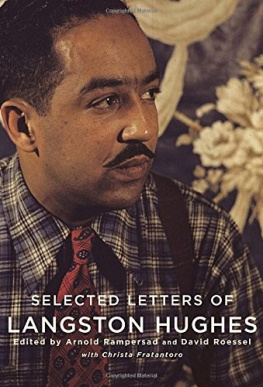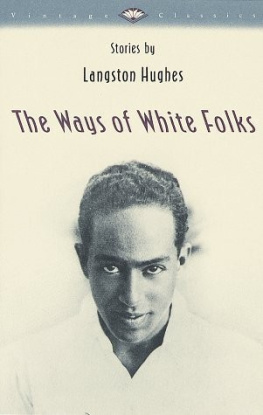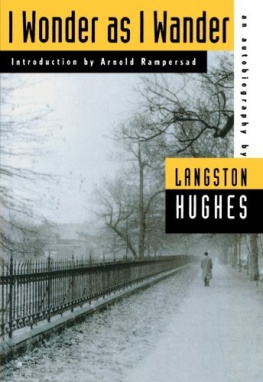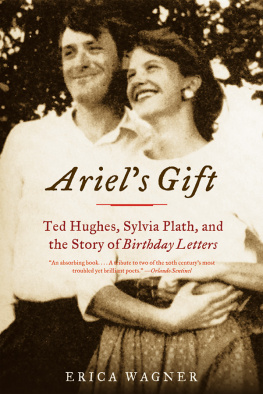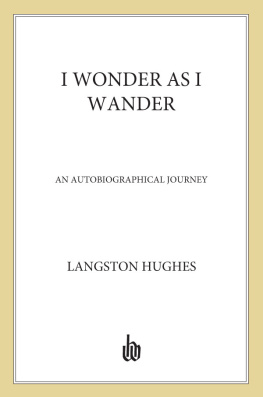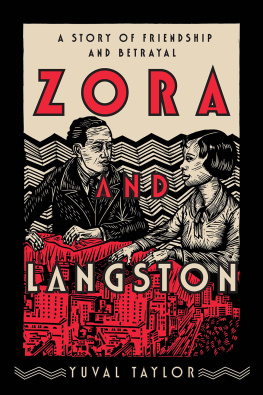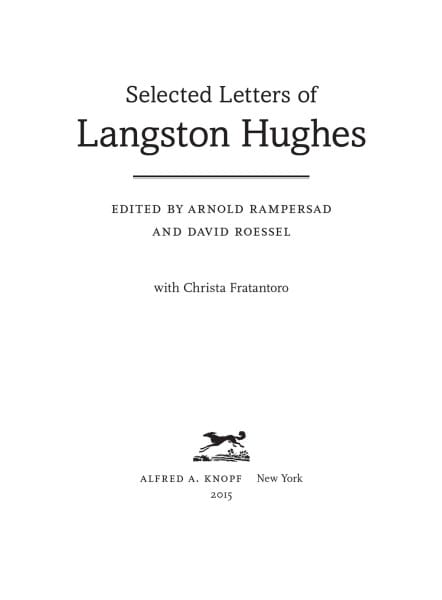THIS IS A BORZOI BOOK
PUBLISHED BY ALFRED A. KNOPF
Copyright 2015 by The Estate of Langston Hughes
Additional material copyright 2015 by Arnold Rampersad
All rights reserved. Published in the United States by Alfred A. Knopf, a division of Random House LLC, New York, and distributed in Canada by Random House of Canada Limited, Toronto, Penguin Random House companies.
www.aaknopf.com
Knopf, Borzoi Books, and the colophon are registered trademarks of Random House LLC.
Library of Congress Cataloging-in-Publication Data
[Correspondence. Selections]
The Selected Letters of Langston Hughes/edited by Arnold Rampersad and David Roessel ; with Christa Fratantoro.
pages cm
Includes index.
ISBN 978-0-375-41379-7 (hardcover) ISBN 978-0-385-35356-4 (eBook) 1. Hughes, Langston, 19021967Correspondence. 2. Authors, American20th centuryCorrespondence. 3. African American authorsCorrespondence. I. Rampersad, Arnold. II. Roessel, David E. (David Ernest), 1954
PS 3515. U 274 Z 48 2014
818.5209dc23
[ B ]
2014014896
Front-of-jacket photograph of Langston Hughes, 1940, by Carl Van Vechten.
Used with permission of the Van Vechten Trust. Print: Yale Collection of
American Literature, Beinecke Rare Book and Manuscript Library.
Jacket design by Carol Devine Carson
v3.1
To Judith Jones,
an extraordinary editor
Contents
PART I
We Have Tomorrow, 1921 to 1931
PART II
Let America Be America Again, 1931 to 1939
PART III
I Do Not Need Freedom When Im Dead, 1939 to 1949
PART IV
The Rumble of a Dream Deferred, 1950 to 1960
PART V
I Heard the Horn of Plenty Blowing, 1960 to 1967
Introduction
Arnold Rampersad
In an envelope marked:
Personal
God addressed me a letter.
In an envelope marked:
Personal
I have given my answer.
LANGSTON HUGHES , PERSONAL , 1933
Who knows better than I, Langston Hughes once wrote to a friend, what letter writing entails? Certainly he knew much about letters. With a crowded life that put him in touch over the decades with thousands of people, the mail was crucial to starting and keeping friendships and to doing business. He admired people who answered letters promptly. His friend Carl Van Vechten, for example, received a flood of mail but usually answered each piece on the day it reached him. Hughes was not so disciplined. In fact, at one point he called himself the worlds worst letter writer. Another time, he confessed to stuffing away a swelling pile of unanswered pieces. Two drawers are full, he noted, so Im moving my sox over. All the same, he wanted to be a faithful correspondent. I leave you now, he ended a letter in 1944, to consider the stack of mail on top of mail piled on the bed. I cannot take my rest until I unpile some of it.
Later in life, living near one of the noisier sections of Harlem, he wrote through the night, when the brownstone row house he shared was likely to be quiet. Then, at three or four or five oclock, or even later, he sat at his typewriter and pounded out letters (more than thirty on many nights) that went all over the world. This was in addition to writing the poems, novels, short stories, plays, autobiographies, histories, translations, opera libretti, song lyrics, childrens books, and newspaper columns, as well as editing anthologies and other volumes, that made so many people long to be in touch with him.
Hughes also knew the importance of saving letters. I guess I never throw anything away ever, he admitted, but he valued letters highly. When Van Vechten founded in 1941 at Yale University an archive devoted to African American culture, Hughes agreed at once to donate all of his papers, including letters to him and also carbon copies of virtually all the letters he wrote. Years passed before he learned that this gift was tax-deductible, but he needed no financial incentive to be diligent about his promise. I got 30 letters today, he noted in 1958, which took me all day to read, answer, and get ready for Yale. When Van Vechten complained that too many black people seemed indifferent to the archive, Hughes agreed that most of them were not collection minded. He thought differently. Those of us who do know and do care, he gently lectured his friend, will just have to redouble our efforts and include in those efforts the bestirring of others.
His love of letters is also seen in his verse. In Personal, reprinted above, he refers to the epistolary form with a studied lack of emotion. However, A Letter to Anne (1927) is an aching messageSince I left you, Anne, / I have seen nothing but youaddressed to a young woman who had stolen his heart in Paris three years before, as he tells us in his autobiography The Big Sea (1940). Dear Lovely Death (1930) both praises and questions death essentially in the form of a letter ( Dear lovely Death, / Change is thy other name). Also basically a letter is his popular poem Theme for English B (1949), in which a young black student from the South, now living in Harlem, turns a teachers request for a personal essay into a poignant message to him (You are white / yet a part of me, as I am a part of you). In Letter (1951), a son writing to his mother from the big city slips $5 into the envelope to show you I still appreciates you. Political protest seizes the form in Open Letter to the South (1932) and in the radical Letter to the Academy (1933). War seemed to heighten Hughess interest in this respect. Covering the Spanish Civil War led him to poems that linked the antifascist cause there to antisegregation efforts at home. These works include Letter from Spain (1937) and Postcard from Spain: Addressed to Alabama (1938). World War II brought pieces such as Dear Mr. President (1943), in which a black soldier denounces racism in Alabama as he and his buddies train there to defend democracy, as well as Will V-Day Be Me-Day Too? (A Negro Fighting Mans Letter to America) (1944). A generation later, Hughess opposition to the war in Vietnam was probably behind Official Notice (1967). It begins: Dear Death: / I got your message / That my son is dead.
The sheer quantity of Hughess letters, as well as their quality, has much to do with his basic love of people. His choice to live in Harlem when many others were fleeing the ghetto starting in the 1950s underscores this point. In 1960, he mocked those who complained that Harlem was a congested area. It is, he agreed. Congested with people. All kinds. And Im lucky enough to call a great many of them my friends. He reached out to whites, too. Starting in 1951, he exchanged letters for over ten years with a small-town Kansas housewife who on an impulseI had no idea who you werehad taken one of his books out of her local library. Like all letter writers, Hughes was sometimes manipulative. On the whole, however, he simply liked people. If he was lonely in essential ways, his main response to his pain was to create a body of art that others could admire and applaud. And letters generated mainly by his art, whether ostensibly about business or pleasure, would always be a crucial feature of his life.
Hughess acute need for other people sprang from his ingrained sense of neglect as a child. His ambitious father, incensed at racism, left his family behind and moved to Mexico when Hughes was an infant. His mother, pursuing her own dreams, often lived so far away that he felt deserted by her as well. Hughes grew up in Lawrence, Kansas, mainly with his maternal grandmother; but she, too, was remote. He recalled her as old, old and almost forbiddingly silent as she lived with her memories. Her first husband had died in 1859 fighting alongside John Brown at Harpers Ferry. Her second husband, Hughess grandfather, who died before Langston was born, had also been a radical abolitionist. Left alone too much of the time, Hughes as a child came to believe in nothing but books and the wonderful world in bookswhere if people suffered, they suffered in beautiful language, not in monosyllables, as we did in Kansas.

